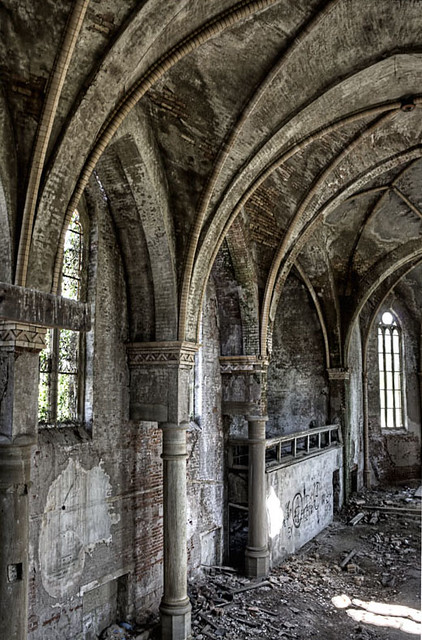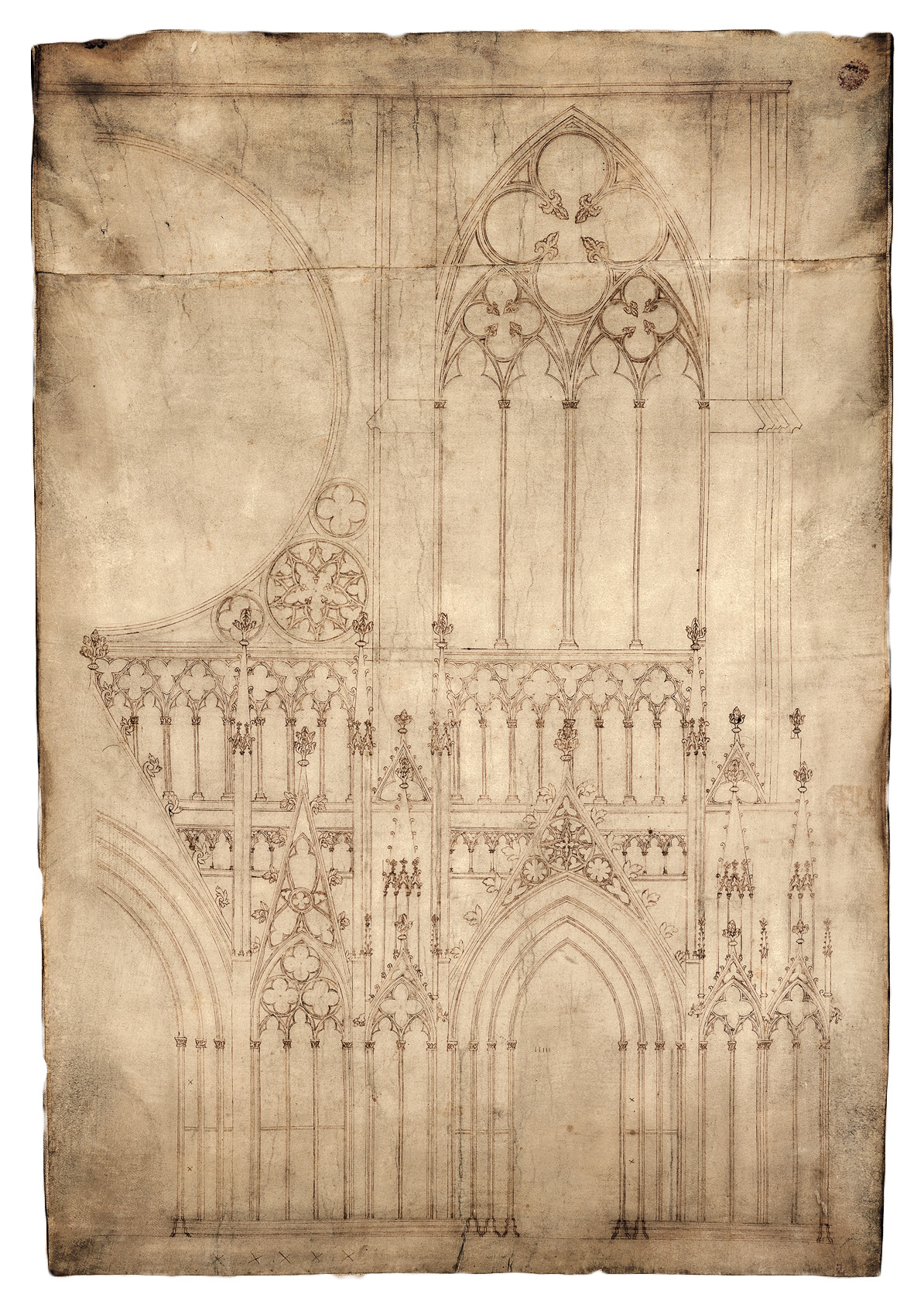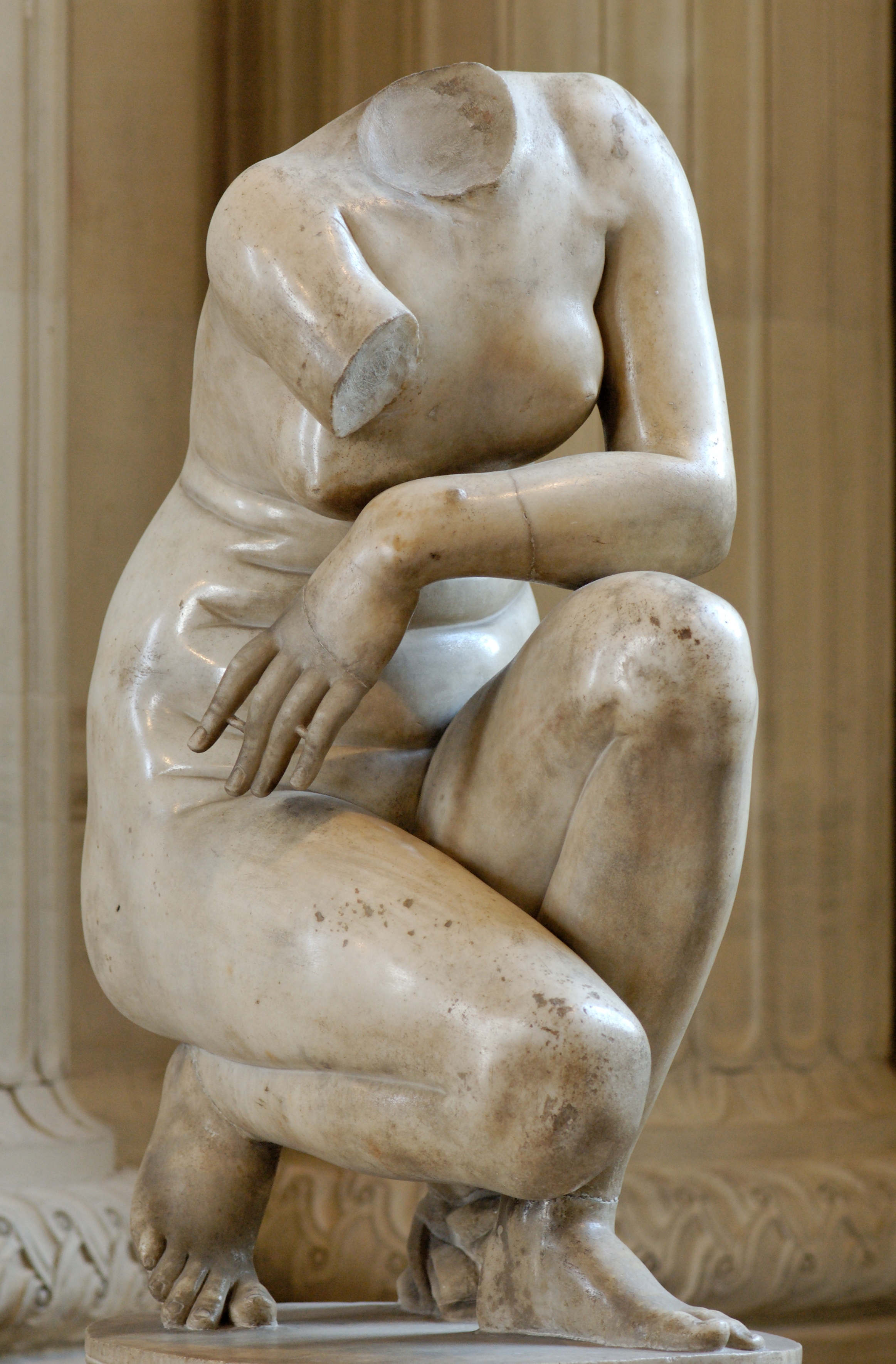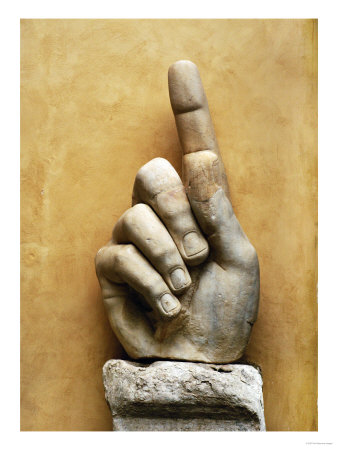63. “But now”, said the Duck, “to business”. He pulled out the flyer that listed all the holy shrines in the south of France. There were dozens of places on the list. I could see right away that many of these listings were fake, and were just stuck into the list of “shrines” for the free advertising. Some were hotels, and others were restaurants and even art galleries. They were all listed as “Miracle Shrine” but you could see they were just in the vicinity, and they were trying to siphon off the tourist traffic.
64. The Duck found at least six real authentic miracle working shrines and Basilicas on the list and the most famous one was the ‘Finger On The Hill.” So we set out for that destination in the 2 CV.
65. There is something about this trip with the Duck that I have been reluctant to mention, but I feel I have to talk about it at this point. The Duck always sat in the back seat, and not up in the passenger seat. At first I thought this was because, being just a duck, he thought the back seat was the proper place for him. But as time went by, though he was my guest in the car, I began to feel like I was a chauffeur taking him on a tour.
66. The duck was just like that college professor you had, the one who knew everything, who was expert in everything, and any I idea you put forward was instantly smashed up and reduced to rubble. People like me are always drawn to such types, and I suppose this is why I was drawn to the Duck though he tried my patience at times. I wanted to prove myself to him and also learn from him, such was the basis of our friendship.
67. We were not far out that morning when we came across a hitchhiker, and the duck suggested I pull over and pick him up. It was non-other that that character I had been talking to in the cafe the other day, the one who tried to tell me he was a child during the battle of the Somme, back there at the beginning in No.6. I am posting his picture to remind you.
68. He introduced himself as Mr. Buboni. I was instantly struck by the similarity to the name of the rat that was interrogated by Hannibal back in No. 55. Just then I caught the Ducks eye looking at me by way of the rear view mirror and the significant look he gave me told me that this was indeed a modern version of Hannibal’s rat.
69. I understood right away that only the Duck and myself would know that Mr. Buboni had once been a rat. Mr. Buboni would have no recollection of it because people do not posses perpetual memory and universal consciousness like any ordinary bird has.
70. The Duck and Buboni, sitting in the back of my CV 2, struck up a very interesting conversation. Apparently Buboni was on his way to the Shrine Of The Finger, also, but not for the cure, but because he was involved in a study of Gothic Architecture, of which the shrine was an important example.
71. This Buboni, he seemed to know more about art architecture, and history than even the Duck. He started to talk about...Well I can’t explain it to you because I just didn’t know a thing he was talking about. But it sounded very grand and wonderful, and when he spoke it sounded just like a book.
72. I tried to write down some of the things Buboni was saying. I hope I got it right, here is a sample: "Now, then, we see the limits of an idea of imitation; it extends only to the sensation of trickery and deception occasioned by a thing being intentionally different from what it seems to be; and the degree of the pleasure depends on the degree of difference and the perfection of the resemblance, not on the nature of the thing resembled."
73. Isn’t that wonderful, just think of being able to come up with the words “intentionally different from what it seems to be”. I thought about this a long time. How, I wondered, can a collection of words sound so brilliant and yet be so impossible .I could not for the life of me even imagine what it meant.
74. But, Buboni’s words were not meaningless because the Duck know exactly what Buboni meant. Not only did the Duck understand what Buboni meant but he could give examples Illustrating the ideas Buboni was trying to explain. Since I did not understand what they were talking about, I just kept quiet. We had a long way to go, and I was sure that eventually I would be able to learn something really good from the two of them.
75. As we traveled along, the Duck and Buboni in the back seat got into a long discussion about the French cathedrals. From what I could gather, there are two types of these cathedrals, there is the “Gothic”, type and the Romanesque type.
76. Now according to what Buboni was saying, the Romanesque types of cathedrals could be likened to an old work boot that is all worn out and was not the right size of shape to begin with but the abject person who owned it had to make do with it because he was so poor and so shrouded in ignorance he could not manage anything better. “Shrouded in ignorance,” the Duck’s words exactly.
77. But according to Buboni, Gothic cathedrals were like some high priced call girl that has been dressed up by her rich patron in the most gaudy flimsy attire available, coated over with diamonds and pearls, dolled up with perfume and makeup, and still she is not satisfied but wants flying buttresses to shore up her sagging figure. She knows she is a knockout, and feels sorry for her old Romanesque Auntie , back in the sticks.
78. And just like an argument in a language you do not understand, certain words and phrases being repeated, you began to have a feeling of what it was all about. For example the Duck would say things like, “They are all visually illiterate
morons”.
morons”.
79. The Duck on the other had, like to say that things were ‘elegant’, ‘fully developed’, and ‘mature’. So, as they talked I realized that it was not just a question of if you liked this or did not like that sort of paintings and statues, it was a matter of if you liked such and such of a picture you 'had the cultural development of a yogurt.'
80. Now my artistic education does not amount to much. I only began going to the museum in the city I lived in after I retired and was looking for something to do. At the museum they offered classes in sketching, watercolor, and sculpture so I signed up for the sculpture class that met on Saturday afternoon.
81. It was there that I was introduced to this business of making a plaster cast with latex, and casting things into plaster. It was there also where I saw you could then paint it with pigment stain and it came out looking like it was made of bronze. The first thing we casted was our hand and it came out so lifelike that you could see all the little hairs and pores of the skin.
82. I took it home and showed it to my wife who said it looked like an amputation, and would I please keep it out in the garage. I took it out to the garage and painted it with some orange latex paint. The next day the first thing I did was go out to the garage to admire my hand sculpture, but all the paint had peeled up from it and it looked like a model for some skin disease.
83. Even though my plaster hand looked like it had skin disease, and even though it was a little deformed looking because the latex mold had bent when it was being cast, Mrs. Frestini thought it was wonderful. She said certain ancient polychrome painted wooden statues in Europe were covered over with peeled and chipping paint, and also all kinds of folk art had no value at all unless most of the paint had chipped of of it.
84. Now all this may not sound like it has anything to do with that argument that was going on between Buboni and the Duck in the back seat of the 2 CV, but it has everything to do with it. Mrs. Frestini thought my cast plaster hand was a work of art, pealing paint and all, and my wife put in in the garbage on Monday morning without even mentioning it to me.
85. Just consider the difference between my wife and Mrs. Festini about the plaster hand. That was the difference between the Duck, and Buboni. What one loved the other hated; what one revered, the other thought belonged in the garbage can. My wife had very little good to say about Mrs. Festini either, saying that she couldn’t afford to have that studio in her back yard except that her husband was a doctor.
86. But I did not know what to think. I was very proud that Mrs. Festini, who taught sculpture at the museum thought my plaster hand was a work of art, but then her painting “Roses in a Pewter Vase” was turned down for the annual art show at the museum when they had a curator from Toledo to be the judge. Last year the judge was from Detroit, and she won a blue ribbon.
87. I did not want to hurt Mrs. Festini’s feelings but I had to ask her why she was turned down. In reply she told me all about Van Gogh, and about the “Salon des Refusés”, which was the start of the impressionist movement, and how if one does not have one's things rejected they can’t be worth very much, just like the folk art has to have peeling paint.
88. I have reached this point and I have not introduced myself. You know that I am a retired postal clerk, and that I am traveling from France down into Italy in order to make plaster casts of Roman artifacts. My name is Richard Bretelsby; sixty-three years old. Above is my pastport picture, taken a few years ago.
89. Here is a picture of the Duck. It was taken many years ago when he was working as the librarian for the Duke of Milan. He does not wear the collar anymore saying, "Do you want people to think I am a dog with an itching problem"?
90. And here is the pasport picture of Buboni. I would tell you more about him except that I don’t know anything yet, he seems to be a professor type, aparently down on his luck, hitch-hiking around Europe. My guess is he is about fifty-five.
91. The is a picture of a man who will show up later in this story. His name is Tonio Leoni. Some people combine his two names and call him Tonioleoni with six sylables, said like this “TO-ni-O-le-O-ne. Other people just call him O-ne. He is perhaps the most important person in this story, but as of yet I have not been able to find out anything about him.
92. And now, having introduced everyone so far, we will get back to this story. As I had been saying, all things considered, being so ignorant about art, the trip with Buboni and the Duck was beginning to look like a vast mine field we were going through where at any instant I could say something stupid and make a fool of myself.
93. We got nearer to the location of the shrine and I began to have an uneasy feeling. The Duck and Buboni, who had been arguing in such an interesting way began to fall silent and turned their attention to the landscape out the windows of the 2 CV. Now I know you think that the South of France is a tourist’s paradise, but I am here to tell you that there are parts of it they do not always want to put into the guide books.
94. I had read that this region is the only one in France where it is legal to burn tires, and therefore thousand of tons of old tires are trucked to this area every day from all over Europe to be burned, and it represents the principal income for the small farmers of the area, because the wine harvest was wiped out by a fungus in the spring of 347 A.D.
95. Not only that but this was the same area where the armies of the French Revolution had to wipe out a Royalist uprising often euphemistically referred to as genocide in those history books partial to the revolutionaries. The peasants were willing to fight to the death to preserve and protect their little Father the King, and looked upon the population of Paris as the offspring of the Devil himself.
96. King Henry the V of England whose slogan was “Burning villages are to war, what mustard is to sausages” swept through the area in the time of the ‘Great Tribulation,’ and yet that was not the worst of it. “The worst period in the history of the region”, according to the guide book the Duck was reading from, “came in the time of the ‘Black Death in the 1300s. It was the time of no man left standing.”
97. Then Buboni said a strange thing. He said, “The Black Death was not all that bad you know.” I immediately glanced up and in the rear view mirror caught the ducks eye, and he gave me a look that said that he saw the importance of the remark. Was it to be expected that, since Buboni had been a rat in his past lives, that somehow, by some twisted logic, he would speak well of Plague?
98. I think the explanation must be, even though Buboni did not posses universal memory like the birds do, still he probably had a vestigial remnant, like the bump where a tail would have been, and so he some access to thoughts and feelings of his rat life. “I say, the plague was not all a bad thing,” he repeated, thinking to bate the duck into another argument.
99. There was no stopping Buboni when he had a theory to propound and so he began. “The dark ages were no piece of cake, everyone knows that. But the biggest problem of that time was the stratification of society. You could not become a street sweeper unless you father and great-grandfather were street sweepers. Bankers were bankers sons, Doctors were Doctors sons, and after a thousand years there were just too many people who had losers for grandfathers and consequently had no place in society.
100. Then along comes the good old Black Death, and even if in your past all you were was a collector of dead peoples clothing for the second hand market, all of a sudden you were a prime candidate to be the Mayor of Paris since everyone else was dead. Plague opened doors that nothing else could open, and gave many a man of talent, who had been subsisting on acorns, a chance for a life.
101. "The Black Death came in the 1300s, and two hundred years later we were humming along in the High Restaurants. Michelangelo was painting the Sistine Chapels and Columbus was in the new world treating the American Indians to their first taste of the Plague. Now consider the Indians existing in a stone age condition..."
102. But here the Duck could not take it any more, and let out a low groan, like a person who thinks that a facial expression is the only appropriate response to idiotic hair brained theories. All he said was, “lets just pull over and ask this farmer here where the shrine is located, I have yet to see a sign anywhere.”
103. So I pulled the 2 CV over, rolled down the window and asked this old man who had no teeth and whose face had fallen down all around his shirt collar many years ago where the shrine was. For an answer he took two steps back from the car and muttered, “Jesus Joseph, and Mary” and crossed himself. Then he said, “Don’t go out there unless you have provided yourself with a gun first.”



















